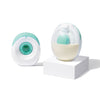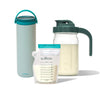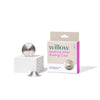Breast milk is truly fascinating. It’s not only the best form of nutrition for your growing baby but as your infant changes and develops, your breast milk morphs and modifies itself to meet his or her nutritional needs.
Here are just 8 of the amazing things that it can help do for your baby:
- build stronger immune systems which leads to less illness overall
- improve their vision
- reduce instances of allergies, eczema and asthma
- reduce risks of childhood cancers including leukemia and lymphomas
- lower the risk of type 1 and 2 Diabetes
- lower the rates of respiratory illness and ear infections
- reduce speech and orthodontic problems
- reduce the risks of sudden infant death syndrome (SIDS)
While it’s easy to forget about yourself while you're in survival mode caring for a newborn, it’s very important that mothers also pay additional attention to their own nutritional status in order to meet the additional nutrient demands of their bodies while nursing and/or pumping.
Remarkably, most mothers are able to produce sufficient quantity and quality of milk for their newborns. This capacity is resilient and remarkably resistant. Did you know that healthy, exclusively breastfeeding women can produce approximately 25 to 27 ounces per day of milk when lactation is fully established? It takes a ton of energy to produce all of that milk.
Lactation requires additional energy and nutrients from the mother’s diet
Mothers require approximately 400 calories per day more energy than non-lactating mothers (If you’re a mom of twins, double that. If you’re a mom of triplets, triple that!). For women consuming a well balanced diet, the increased nutrient requirements can be met by the overall increase in food intake. Mothers increase their requirements not only for energy, but also for protein; vitamins A, C, E, B6, and B12; folate; niacin; riboflavin; thiamine; and the minerals iodine, selenium, and zinc. In contrast, requirements for vitamins D and K and the minerals calcium, fluoride, magnesium, and phosphorus remain approximately the same as non-lactating women. And, as a fun fact about how intune your body is, the requirement for iron is lower because of the lack of periods when breastfeeding.
Vegetarian or vegan diet? Here’s where you can increase your nutritional intakes
Mothers who have vegetarian or vegan diets can maintain their own nutrition while enriching their breast milk by making sure they consume enough protein, calcium, vitamin D and vitamin B12. (For some restrictive diets, dietary supplements may be necessary.)
Omega-3 long-chain polyunsaturated fatty acids, including docosahexaenoic acid (DHA) and eicosapentaenoic acid (EPA), are important in brain development. Breastfeeding mothers should eat 8 to 12 ounces a week (two average servings) of fish and shellfish that have lower concentrations of mercury or vegetarian sources of Omega-3 fatty acids.
Here is a selection of important food sources (with key nutrients!) for lactating mothers:
Calcium: milk, cheese, yogurt, tofu; bok choy, broccoli, kale, collard, mustard, and turnip greens.
Zinc: meat, poultry, seafood, eggs, seeds, legumes, yogurt, whole grains
Magnesium: nuts, seeds, legumes, whole grains, green vegetables, scallops, and oysters
Vitamin B6: bananas, poultry, meat, fish, potatoes, sweet potatoes, spinach, prunes, watermelon, some legumes, fortified cereals, and nuts.
Thiamine: pork, fish, whole grains, organ meats, legumes, corn, peas, seeds, nuts, fortified cereal grain.
Folate: leafy vegetables, fruit, liver, green beans, fortified cereals, legumes, and whole-grain cereals.
DHA and EPA (fish): canned light tuna, salmon, pollock, catfish, and shrimp. Mother’s should avoid fish that are high in mercury such as pike, marlin, mackerel, tilefish, swordfish, and shark.
DHA and EPA (vegetarian): algal or soybean oil, walnuts, chia, hemp and flax seeds
The Influence of Traditional and Cultural Diets
The influence of traditional and cultural diets can create conflicting information for moms. In some societies a food may be considered beneficial to a breastfeeding mother, but in another culture they may be cautioned against the exact same food. For example, certain spices or spicy foods can be considered bad for babies in some cultures, but in others spices and spicy foods form a big part of their everyday cuisine. The varied flavors in a mother’s diet will appear in breastmilk, too. This means that your baby may enjoy breast milk flavored with the taste of your favorite food! And the really amazing thing is that this actually helps them get ready for the table foods you eventually introduce them to. In addition, naturally occurring pigments in vegetables and herbal supplements or food dyes added to foods, may change the color of breastmilk. So, don’t worry if you see a pinkish hue to your breast milk after eating a beet salad. If you find your baby is often gassy or colicky and has changes in stool pattern after you eat a particular food, try avoiding that food for several weeks and see if the symptoms go away. Then try the food again to see if you still need to avoid it.
Alcohol and Caffeine (and What to Know)
Some breastfeeding mothers are also concerned about how much alcohol and caffeine is safe to consume. When you drink alcohol, it passes into your breast milk at concentrations similar to those found in your bloodstream. Although a breast-fed baby is exposed to just a fraction of the alcohol his or her mother drinks, a newborn eliminates alcohol from his or her body at only half the rate of an adult. To minimize transfer of alcohol to the infant, mothers should wait at least two hours per serving of alcohol before breastfeeding.
Most breastfeeding women can drink a moderate amount of caffeine without significant effects on their infants. The current recommendation it to limit caffeine intake to 300 milligrams of caffeine per day while nursing– or approximately 3 cups. In a healthy adult, caffeine stays in the body for three to seven hours. However, infants can hold onto it for up to 130 hours, as their liver and kidneys are not fully developed. Even small amounts that pass through to breast milk can build up in your baby’s body over time, especially in newborns.
Signs that your caffeine intake is affecting your baby include:
- Increased fussiness
- Increased irritability
- Difficulty going to sleep or staying asleep
- Hyperactivity
- Restlessness
- Loose stool
Most importantly, enjoy eating a variety of foods, colors and flavors to give a diverse nutrient profile to your baby and for yourself! If you have more questions or concerns, please consult your doctor.
Dr. Manisha Panchal, M.D. is practicing clinician in the heart of Silicon Valley. She values educating parents on how to provide optimal health for their child and uses evidence-based medicine in treating children, while emphasizing preventative care. She is passionate about raising awareness of health care issues and has given talks and lectures on parenting and children’s health issues in the community. She has also worked to educate industry professionals in the area of childhood nutrition
Get nourished with Chiyo
Get nourished with Chiyo
Chiyo’s meal programs are specifically designed to meet moms where they are — whether that’s trying to conceive or postpartum. Use the code WILLOW30 to get $30 off your first order.


















